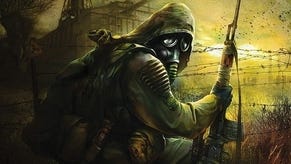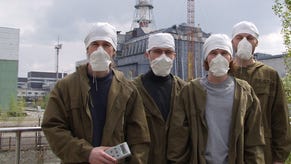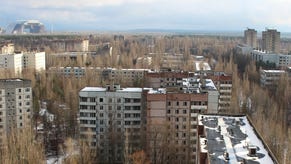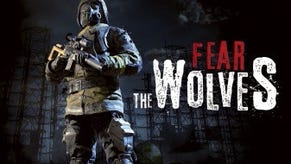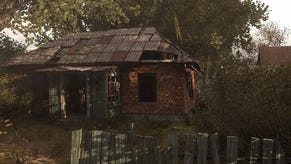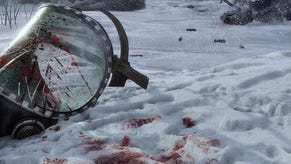S.T.A.L.K.E.R. Shadow of Chernobyl
Ready, steady, glow.
The implications of the A-Life artificial intelligence system are apparent right from the start. The various beasts roaming the wasteland - mostly scabby dog things and bloated mutant hogs to start with - behave in eerily realistic ways. They hunt in packs, attack each other and can even be scared off rather than engaged in combat. The same applies to your fellow Stalkers, who have their own routines and jobs to do. Every character even has a unique name and, while it doesn't really add much to the gameplay to know that both friendly and hostile NPCs will cross from one map to another to exploit power vacuums, it does make for an easier-to-swallow alternative to tired old respawn points. What it does mean is that not only does combat benefit from intelligent foes, but you can use the gameworld to your advantage.
For example, the first area you start in - essentially a large training zone - is bisected by a shattered railway bridge. The way through the bridge is guarded by bandits, who will demand 500 roubles each time you wish to pass through. After paying up once, I decided my money could be better spent elsewhere, and decided to just make a run for it on the return journey. Sure enough, they opened fire, but I was able to out-run them. After that, they didn't seem open to bribery. So the next time I needed to cross their turf, I waited until dark. Lurking a short distance away from their barricade, I flashed my torch and fired off a few warning shots. As they came to investigate, I cheekily doubled back around them and sauntered through their den unscathed - even stopping to swipe their stash of vodka on the way.
Later still, having noticed a group of fellow Stalkers nearby on the map, I goaded the bandits into chasing me and led them into a massive firefight. The bandits duly killed by my unknowing accomplices (with minimal help from myself) I was able to swap my feeble pistol for an arsenal of automatic weapons stolen from the corpses. Unscripted moments such as this, which happen because of your direct actions in the simulated world, tickle the pleasure nodes on two levels. It's fun because it involves big guns going bang, and it's exciting because it feels a little bit random and chaotic, an honest-to-goodness event unfettered by the confines of What The Game Wants.
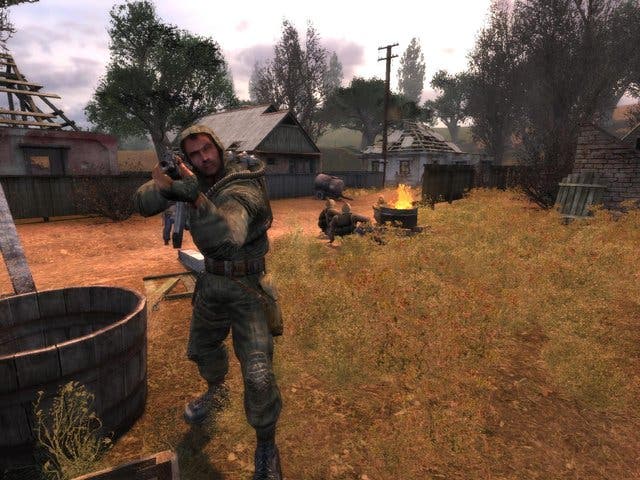
This sort of gameplay isn't anything new, as Deus Ex fans will noisily point out, but it's still far from the norm. In a genre where corridors and ultraviolence are still the preferred options, S.T.A.L.K.E.R looks like being one of the few games to deliver something a little more thoughtful.
Even so, it's probably wise to quell some of those wilder FPS/RPG crossbreed fantasies. While S.T.A.L.K.E.R certainly borrows elements from the role-playing textbook, it never strays too far from its shooty roots. There's no character progression, no way of improving your stats, for instance. The weight of the items you carry affects your stamina, and if you load up your backpack with guns and ammo, you'll find your stamina bar runs low even when not sprinting. "You are too tired to walk" is your cue to dump some of your baggage, this game's equivalent to "You are over-encumbered". Yet there's no way to increase the amount you can carry, or to speed up your recovery. Weapons degrade with use, but you can't repair them yourself. It's hardly a deal breaker, but those expecting a revolutionary genre hybrid would seem to be barking up the wrong tree.
Interaction with NPCs also seems to be fairly standard stuff, with rigid conversation trees and somewhat basic attitude parameters. If you're nice to someone (which almost always seems to involve responding to a cry for help, or handing a medpack to a wounded Stalker) then they'll show green on your radar, as a friend. If someone is neutral towards you (showing yellow on the map and your crosshair) and you approach with guns drawn, they'll respond in kind. Holster your piece, and they're more open to a bit of chat. You do find you get the same responses to the same questions though, with only mission specific characters offering more in-depth interaction options. I saved one Stalker from a pack of mutant dogs, and earned his undying gratitude, only to be told to "bugger off" when I tried to talk to him minutes later, so it seems that their moods may be as hilariously random as Oblivion's fickle inhabitants.
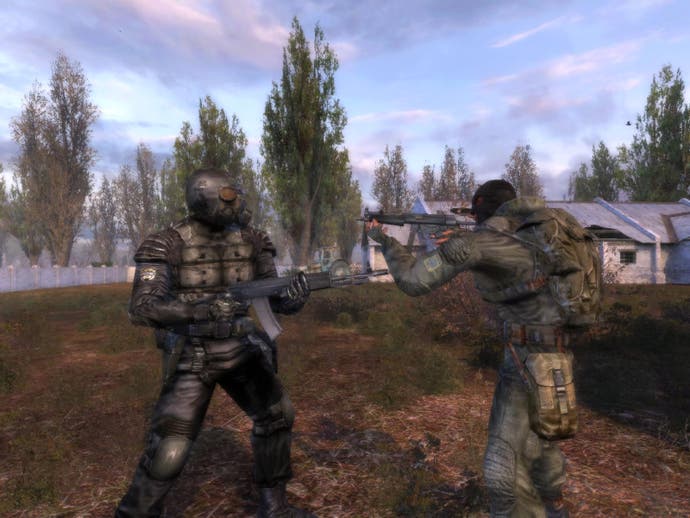
All of this doesn't really impact on the game's immediate appeal, especially if you approach it as a shooter rather than an adventure, but it does raise a question mark over the long-term appeal of the numerous optional missions. In a true RPG, you'll grind through as many side quests as possible because each encounter, each skill you use, makes you stronger and better equipped for what lies ahead. If the only reason for undertaking S.T.A.L.K.E.R's often lengthy secondary objectives is to earn more cash, many players may eventually choose to focus on the story missions.
This concern is heightened by the sparse nature of the early maps, which are undeniably large and luscious, but don't really offer much in the way of actual things to find. Again, much like Oblivion, the game takes a good few hours to unfurl in all its glory. Once you get past the early stages, the maps open out to offer a lot more opportunities for improvised exploration and character interaction.
All this RPG banter is, of course, secondary to how the game performs at its primary function - that of first-person shooter. With thirty or so real world firearms on offer, along with weapon jams and different ammo types, the emphasis is on precision and tactics rather than run-and-gun pyrotechnics. The very first mission you're offered - to clear a small farm of bandits - acts as a solid introduction to what's expected. Teamed up with a squad of AI Stalkers (or, rather, tagging along in their wake) any attempt to steam into the action, guns blazing, is likely to result in rapid death. Equipped with just a pistol, skulking and sniping are the order of the day, and it's a lesson that holds true even as you progress to more powerful weapons.
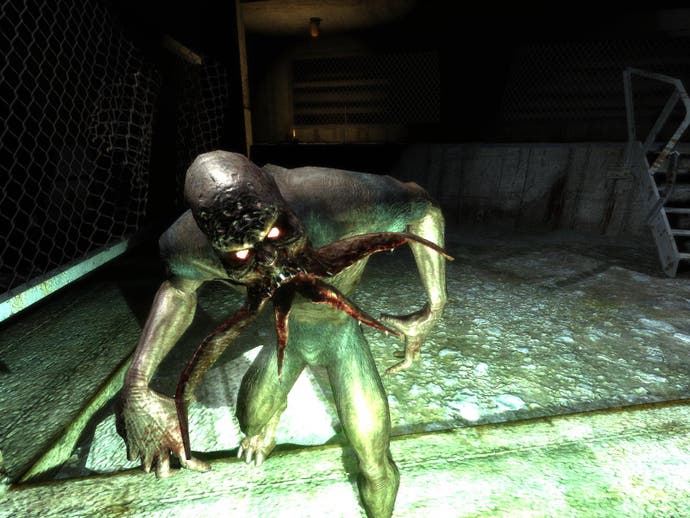
A mission to steal government documents from a dilapidated military base provides another showcase. The sort of prolonged pitched battle that would be the centrepiece of most shooters, here it's merely an optional objective. And getting the documents is only half the task - you still have to deliver them to a middleman on the other side of the map. While you may come to question the ultimate purpose of such missions, it's clear that S.T.A.L.K.E.R is going to offer a lot of action for your money. At the very least, it's looking sure to be an addictive and varied shooter set in a compellingly realised environment.
Start thinking of it as a kinky radioactive threesome between Far Cry and Deus Ex, with a smidgeon of Oblivion's RPG trimmings, and you'll have a pretty good idea of what's coming your way in March. In the meantime, why not point your face at our competition and see if you can win yourself a key to the soon-come multiplayer beta test?

